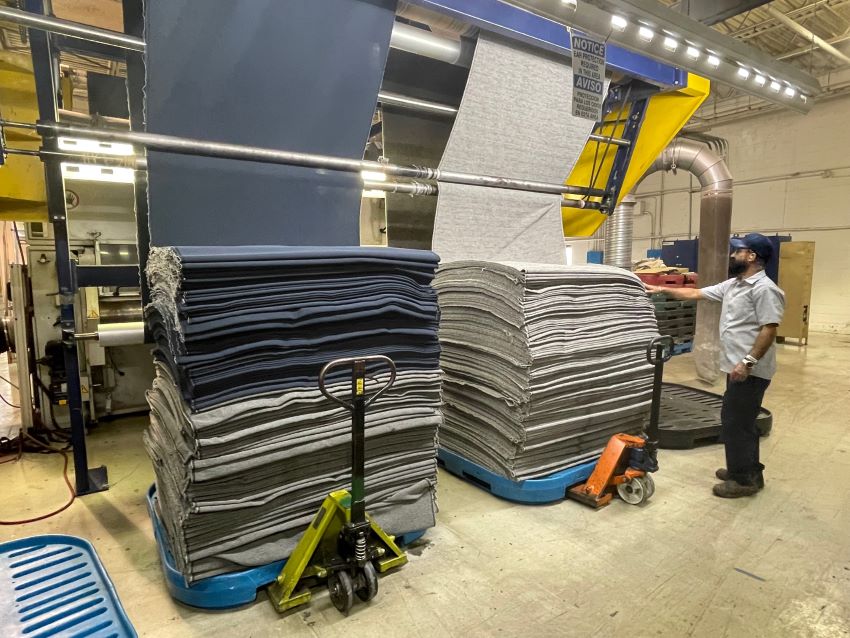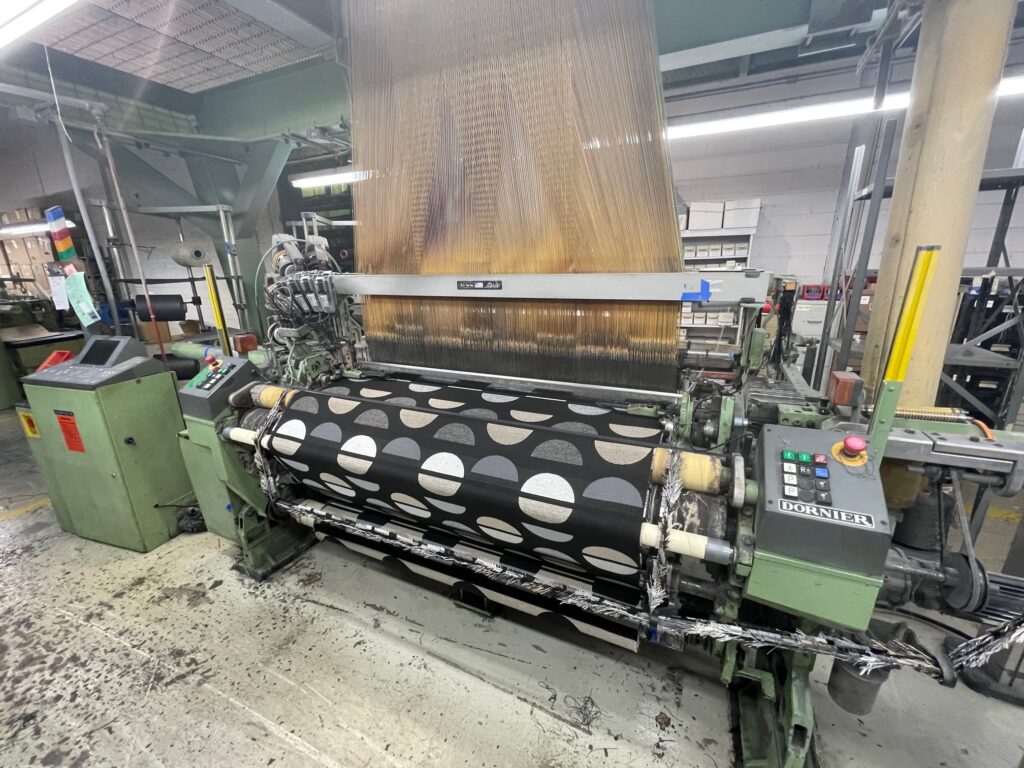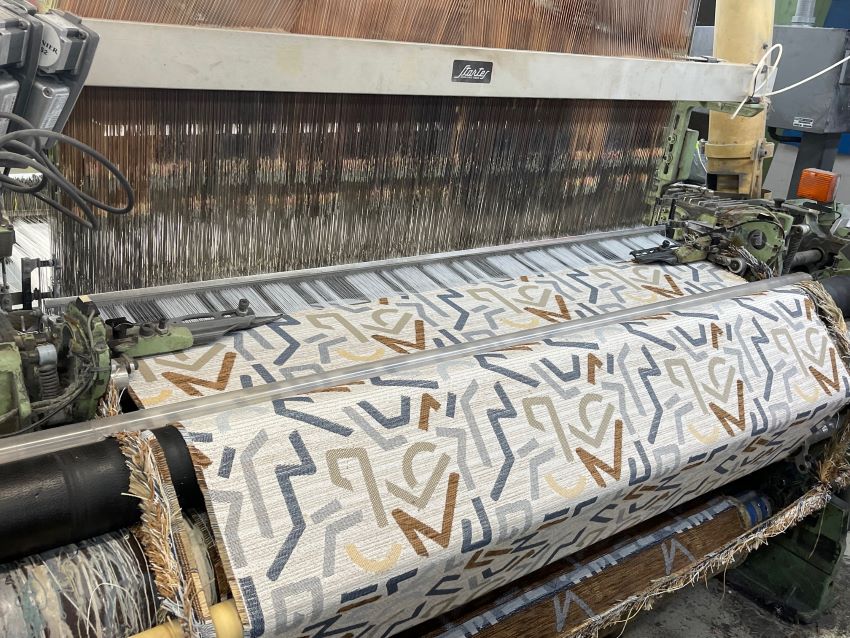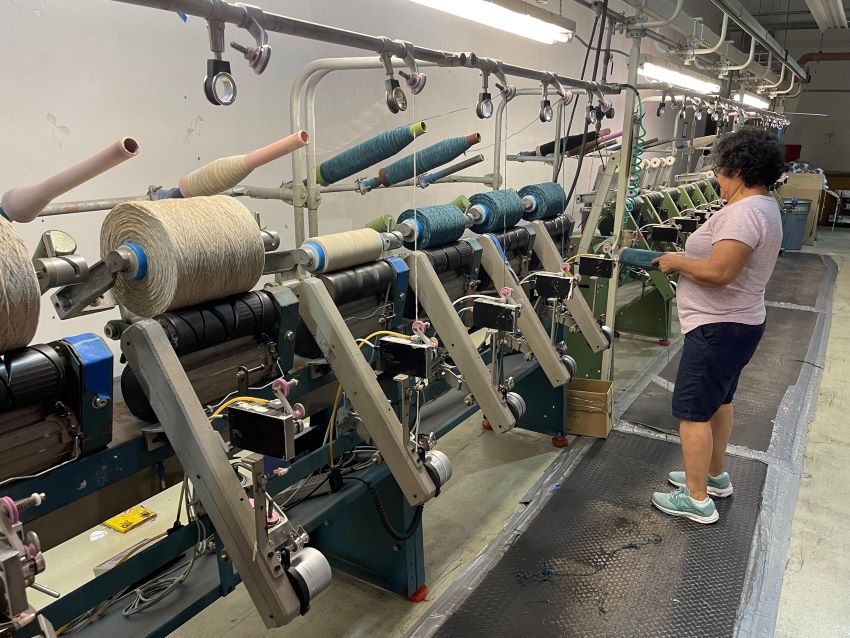Domestic capacity, speed to market keeps company resilient as a supplier to the domestic upholstery industry
HIGH POINT — When Richloom Weaving purchased the fabric manufacturing facilities of Chambers Fabrics here in late 2019, it could hardly have known that the industry was about to enter one of the most disruptive periods in history.
But that’s what happened with Covid-19, which upended entire supply chains, from the availability of raw materials to the skyrocketing costs of shipping goods, not to mention the cost of the materials themselves.
Yet demand also skyrocketed, making an asset such as Chamber’s 150,000-square-foot production facilities in High Point extremely important thanks to their proximity to the domestic market. For upholstery manufacturers and their retail customers alike, that has meant being able to get fabrics designed, produced and delivered much quicker than shipping from Asia.
“It has been a win-win, particularly because of Covid and all of the supply chain issues, to have a domestic mill, domestic product and speed to market,” said Ray Chambers, who started the business in 1988, first selling woven fabrics from other producers, and then starting his own fabric manufacturing operation in 1995. Today he is president of manufacturing and engineering at Richloom Weaving.

“So it is about speed to market. You do the design here and you don’t have to send it to China and have them interpret the designs, plus there is no four to six-week timeframe to actually get it here.”
As an example, Chambers recounts a story where a customer attending the Showtime fabric show in High Point liked a particular fabric, but wanted the design to be twice as large as it was in the sample. Chambers made a call to the plant and before the customer left the showroom, it had a new sample completed featuring the design specs they requested.
That made it very hard for the customer to say no to the product; thus an order was soon in hand.
Among other assets, it was that type of flexibility that attracted Richloom — which imports many of its fabrics from countries such as China — to Chambers Fabrics. And while it has some other strategic partnerships that produce prints and other products in the U.S., Richloom Weaving is the only domestic manufacturing it currently owns and operates, thus giving it control over a big part of its domestic supply chain.
“As part of our future strategy, we needed a domestic operation,” said Nolan Mitchell, Richloom’s senior vice president, upholstery. He noted that the facility, now called Richloom Weaving, “checked every box in terms of location, product, operations and more.”
Of the timing, he added, “As the saying goes, “sometimes it is better to be lucky than smart.” With the global supply chain being a mess, having domestic production was key.”
Mitchell added that the facility also has helped fuel growth due to demand for domestic product. Today, he estimated it represents about 10% of the company’s overall business, but expects that “to grow substantially over the coming years.”

The relationship has been mutually beneficial in many ways, officials note. For example, while Chambers had a number of unique furniture accounts it brought to the mix, Richloom also brought in other types of business in addition to furniture, such as more RV accounts.
This has also contributed to the growth that the plant has seen since the acquisition. In addition to double digit growth each year since the purchase, Chambers said business was up 64% year-to-date as of early June.
“It is not just upholstery anymore,” Chambers said, noting that Chambers only sold a handful of RV accounts previously. “It is just the breadth of product they offer that allows them to take advantage of this mill and provides a lot of different opportunities.”
Chambers noted that Richloom also has brought other resources to the mix in general — ranging from merchandisers, designers and marketing professionals — all of whom also have helped fuel growth since the acquisition.
Richloom also has expanded the overall account base from what Chambers had previously.

“The also have a more diverse account base where they do more RV, and we only did a little RV and where they do contract and we didn’t do any contract,” Chambers said. “They also do outdoor fabrics and we didn’t do any outdoor fabrics. They have been able to bring that to this mill and grow this mill dramatically over a short period of time. But also, domestic demand has picked up because of all the issues with supply chain and importing.”
For Richloom, speed to market has been one of the key advantages of having such as facility.
“Not only are we able to produce products at comparable prices, but being domestic, we don’t have to add additional freight costs and time on the water compared to our imported products,” Mitchell said. “So for many customers, this is a huge cost and time savings.”

It also has what Mitchell describes as a “quicker and more secure supply chain generally speaking.”
Current lead times — from the time of order to when a product ships to an upholstery manufacturer — have been running about 8- 10 weeks on average, down from 12 at the height of the pandemic. It’s a number that Ray Chambers said he would like to see move to as low as six weeks.
The company also continues to produce market samples in two weeks and floor samples in four weeks, although some can be produced more quickly depending on a customer’s needs.
But achieving quicker lead times on deliveries to manufacturers will involve boosting the workforce beyond the current 70 workers, many of whom have been with the company for many decades.
“We could have 100-plus workers if we could find them,” Chambers said. “So the biggest challenge today is finding good people.”

Fixers, who maintain the looms and fix mechanical problems as they arise, are perhaps the hardest to find and train as it takes three to five years to get them to their maximum proficiency.
“It has the longest training curve, and it’s really the most important,” Chambers said. “They are the ones who keep those machines running.”
While the company continues to look for individuals with that type of experience, it also trains people in house, moving them into another skill set where they can eventually see a boost in pay.
In the past, the High Point facility has run seven days a week, but of late was running six due to the challenge in finding more workers.
“Our backlog is as large as it’s ever been but our production is up 60%, so we are trying to reel it in as fast as we can get people,” Chambers added, further explaining that while the backlog remains high, production is also up substantially so the company is weaving and shipping more finished product. “We have the equipment to eat into the backlog and we have the supply chain to eat into the backlog. It is a matter of getting the people.”

But he said that Richloom’s generous compensation and benefits package has been a major asset in recruitment and retention. Chambers said this goes from providing worker raises to other gestures such as special lunches in recognition of hard work.
“They have done everything I could have asked for my employees, and I consider them my employees because they are near and dear to my heart and they have been here — most of them — a very long time,” Chambers said, noting that Richloom has provided everything from raises to good benefits such as health care and paid time off. “That was one of the big sticking points for me —to take care of my people — and they have done that.”
“It has been a win-win for everybody,” Chambers added. “This has been a wonderful marriage…I have done everything I said I would do, and they have done everything they said they would do. They are taking care of the employees and they have taken care of me and we have done everything right together.”
Eventually, Chambers said he would like to see the business back to 135 employees, which it was at its peak employment around 2006. While that will depend on the company’s ability to find good talent, he believes that Richloom’s growth trajectory will help make it possible.
“We would love to be back there and be even bigger,” he said, noting that Richloom already has purchased some new equipment for the facility and has its eye on growth.
He also noted that there is room to grow its manufacturing and distribution footprint on 17 developable acres.
“They want to purchase more equipment, and they want to grow this mill,” he said, noting that this also has been part of his own mindset from early on. “I set this up when I came here and decided what to put where. I set it up from the very beginning for expansion.”
Mitchell, Richloom’s senior vice president, upholstery, said that demand for domestic upholstery has grown since the acquisition and that he expects it to grow over time. Thus, the company plans to continue investing in the operation now and in the future.
“Be it monthly, or annually we are putting up numbers that haven’t been seen in seven-plus years,” he said, adding that Richloom also sees the acquisition as win-win for everyone involved.
“I completely agree with Ray on this,” Mitchell said. “And I want to add that having Ray as part of the team has been crucial to our success. Ray’s knowledge, leadership and intimate understanding of Richloom Weaving helps in ways that isn’t quantifiable.”




